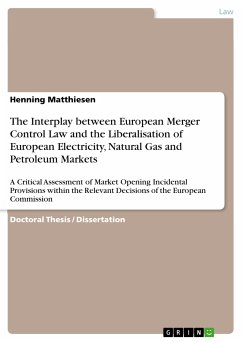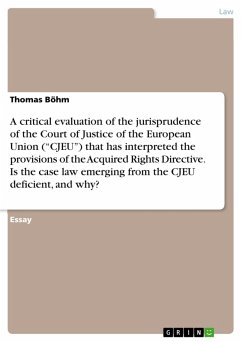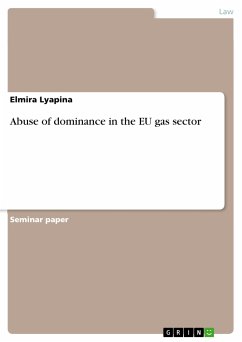Doctoral Thesis / Dissertation from the year 2020 in the subject Law - European and International Law, Intellectual Properties, grade: 2,2, Leuphana Universität Lüneburg (Fakultät Wirtschaftswissenschaften), language: English, abstract: This doctoral thesis examines how European merger control law is applied to the energy sector and to which extent its application may facilitate the liberalisation of the electricity, natural gas and petroleum industries so that only those concentrations will be cleared that honour the principles of the liberalisation directives. In 2007, the Commission emphasized that a real internal European energy market is essential to meet Europe's three energy objectives. These were for example competitiveness to cut costs for citizens and undertakings to foster energy efficiency and investment, sustainability including emissions trading, and security of supply with high standards of public service obligations. The EU issued three pre-liberalisation directives since the 1990s. Dissatisfied with the existing monopolistic structures, in Germany through demarcation and exclusive concession agreements for the supply of electricity and natural gas, which were until 1998 exempted from the cartel prohibition provision, and the prevalence of exclusive rights on the energy markets, the Commission triggered infringement proceedings against four Member States. The CJEU confirmed that the Commission has the power to abolish monopoly rights under certain circumstances and the rulings had the effect of convincing the member states to enter into negotiations for an opening up of energy markets owing to the internal market energy liberalization directives 1996 / 1998 / 2003 / 2009 / 2019. The 2nd liberalisation package of 2003 brought a widening of market opening and acceleration of pace of market opening to a greater number of eligible customers and an increase in the provisions on management and legal unbundling. The 3rd energy package of 2009 addressed ownership unbundling of key-infrastructure ownership and energy wholesale and retail supply consisting of three regulations and two directives. The 4th liberalization package inter alia consists of a new IEMD2019 and IGMD2019 and addresses energy efficiency and rules on good governance in the Energy Union. A brief analysis of the economic implications of concentrations is followed by an assessment of the evolution of European merger control law since 1989, 1997 and 2004. Then, the theoretical findings are contrasted to the results of recent merger proceedings in the energy sector.
Dieser Download kann aus rechtlichen Gründen nur mit Rechnungsadresse in A, B, BG, CY, CZ, D, DK, EW, E, FIN, F, GR, HR, H, IRL, I, LT, L, LR, M, NL, PL, P, R, S, SLO, SK ausgeliefert werden.









